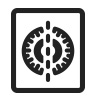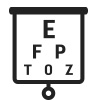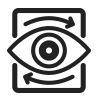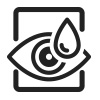Affordable Comprehensive Eye Exams
Routine eye exams are an important part of preventative health care. Even with perfect vision, an annual eye exam is a simple, cost-effective way to protect your vision and health.
Routine eye exams are an important part of preventative health care. Even with perfect vision, an annual eye exam is a simple, cost-effective way to protect your vision and health.
We offer comprehensive eye exams starting at $85* . Your eye exam may be covered by insurance. Be sure to ask us about your plan prior to or during your visit.
Eye exams are important for everyone, from children to adults and seniors. Even if you have no symptoms, regular eye exams help maintain healthy vision and detect problems early.
Before your exam, our opticians may perform quick, non-invasive screenings, like autorefraction, eye pressure checks or visual fields tests.

An autorefractor measures how light changes as it enters your eyes to quickly estimate your vision prescription.

An autorefractor measures how light changes as it enters your eyes to quickly estimate your vision prescription.

During a visual field test, you’ll look straight ahead while small lights flash in your side vision to check how well you can see in your peripheral view.
During retinal imaging, a special camera takes detailed pictures of the back of your eye without dilation. The process is quick, comfortable, and provides immediate results.
Your overall health, previous visits, and current symptoms will determine the specific tests included in your next eye exam. In general, a comprehensive adult eye exam may include:

Assess how well your eyes change focus and move in unison to evaluate focus or binocular vision.

Your doctor uses eye charts and specialized tests to check visual sharpness, depth perception, color vision, side vision, eye muscle movement, and light sensitivity.

Your doctor tests how lenses focus light while you choose which option looks clearer, helping refine the prescription for nearsightedness, farsightedness, or astigmatism.

A circle of light is focused on the cornea (the clear outer part of your eye) and its reflection is measured. This lets your optometrist measure the outer contour to measure astigmatism and get the right fit for contact lenses.

*only if necessary
Eye drops dilate the pupils for your doctor to view your retina, optic nerve, and other internal eye structures.


A full evaluation with one of our doctors, including vision testing, eye health assessments and personalized recommendations.
If you wear or want to start wearing contact lenses, you’ll need a contact lens exam and fitting to measure your pupil and iris, map your cornea, and evaluate your tear film.
The American Optometric Association recommends the following guidelines for people with no signs of eye or vision problems:
| 5 - 18 Years | Once a year |
| 19 - 60 Years | Every 1-2 years or as recommended |
| 60+ Years | Once a year |
*Our doctors of optometry provide eye exams for children aged 5 and older. For children younger than 5, please contact us for a referral.
If chronic conditions like diabetes or glaucoma run in your family, you may need more frequent checkups. Our optometrists provide eye exams for patients with diabetes and are qualified to treat eye problems associated with Type 1 or Type 2 diabetes.
Health problems, including cancer, hypertension, diabetes, and more, can be detected during a routine eye exam. Your eye doctor can notice warning signs of systemic diseases by evaluating the blood vessel health in your retina. Many eye diseases don’t have obvious symptoms such as pain or vision changes, until a serious eye problem has developed.
You may not realize you’re missing perfect vision until you see it. For children, vision issues can affect learning, sports and social growth.
For most all ages, long hours on screens often bring digital eye strain, causing dryness, headaches, and blurred vision. Thus, eyesight can decline gradually.
At Eye Boutique, we take most types of vision insurance and offer free coverage checks to make sure you’re getting the maximum benefits from your plan. If there are any out-of-pocket expenses associated with getting your eye exam, we’ll tell you exactly how it breaks down so you won’t have any surprises.
If you have a medical condition like pink eye or glaucoma, your medical insurance may also be billed for related eye care services.
Our highly trained opticians are happy to show you how to get the most value out of your vision insurance, union health plan, HSA or flex dollars.
Right now we’re offering comprehensive eye exams for $85* at all Eye Boutique locations (contact lens examinations excluded, terms & conditions apply).
Most people should have an eye exam every 1–2 years, but your doctor will recommend what’s best for you.
At-home eye exams provide limited and insufficient information in that they are not able to evaluate the health of your eyes. Optometrist-administered eye exams are comprehensive, health-focused and precise. Although at-home eye exams can give you a small amount of information about your eyesight, seeing an eye doctor to assess your eye health is always recommended.
Eye exams are only $85* at Eye Boutique.
Your overall health, health history and current eye-related concerns all determine what your unique eye exam and eye care will look like. Your eye exam may include:
You may also have any of the tests below, which measure your depth perception, color vision, peripheral vision, eye muscle function and how pupils respond to light.